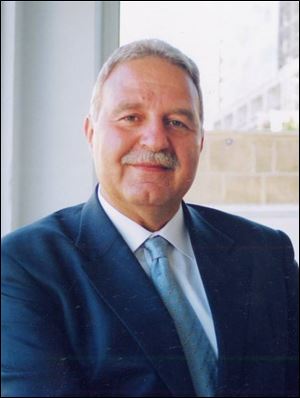
Ex-Toledoan now in Lebanon helps those in need
7/25/2006
Osta Abourejaili
For more than a decade, Osta Abourejaili greeted guests at two popular Toledo restaurants with a welcoming smile and an invitation to return.
Now, as the conflict between Israel and his native Lebanon continues, the former maitre d'hotel of the Beirut restaurant in Toledo and current mayor of the Lebanese town of Bhamdoun is welcoming a new kind of guest: those displaced by war.
Mr. Abourejaili, now in his second term, has seen the population of the mountain resort town about 15 miles north of the Lebanese capital of Beirut swell in recent days from about 6,000 to more than 56,000 people. The influx wasn't the result of tourists, but rather people fleeing the southern portions of Lebanon under barrage from Israeli military firepower.
"We are doing our best to help everybody," Mr. Abourejaili told The Blade in a telephone interview yesterday. "We are a tourist town, so we only know how to say welcome. A week ago, I was saying welcome to Kuwaiti tourists, now I am saying welcome to refugees."
The luxury hotels and high-rise condominiums that the people of Bhamdoun spent years rebuilding after the end of Lebanon's civil war in 1990 are now filled with families - some as large as 30 people.
Those with money were able to rent private quarters. Most sought shelter where they could. The town's schools have been opened and mattresses and blankets brought in to give hundreds of people a place to stay.
Mr. Abourejaili, who left Toledo in 1997 to return to Bhamdoun, said the start of this summer was a typical one. His hometown became the destination point for more than 30,000 tourists arriving from countries such as Kuwait, Saudi Arabia, and the United Arab Emirates.
That changed quickly after the Hezbollah attack and the Israeli response. Within a week's time, he said, thousands of tourists evacuated the country, leaving Bhamdoun virtually empty.
"They left because of safety They had a good time, but good times and F-16 [fighter jets] don't go," Mr. Abourejaili said. "By the time everybody moved [out], that's when all the refugees started coming."
Among them was Hiyam Kanaan of Bowling Green and her two children Alissa Tafla, 7, and Hadi Tafla, 4. Ms. Kanaan's husband, Ghassan Tafla, said his family was visiting relatives in southern Lebanon when the first of the bombs fell. He said he remembers speaking to his wife while she was crowded with others in a small bathroom, the safest place she could find.
"I could hear the kids screaming and I asked her to leave as soon as she could. They left and went to the mountains," he said.
Mr. Tafla said he was working and so he couldn't join his family on their three-month vacation. He said his family ended up in Bhamdoun, where Mr. Abourejaili personally saw to it that they had food while they waited until they could be evacuated.
On Friday, the family said good-bye to their relatives and made the three-day trip by boat, military helicopter, and plane back to Wood County.
"If you see someone caring about your well-being, that makes a difference," Mr. Tafla said of Mr. Abourejaili, whom he remembered meeting when dining at the Beirut.
As mayor, Mr. Abourejaili is often the one to whom residents turn. He said he has spoken daily with dozens of the thousands of people fleeing into his town, and has worked to make sure everyone has food, shelter, and any medication that they require. To date, his town has not received any financial assistance, so the community has undertaken the costs involved with that to the tune of about $150,000 in just a month.
But Mr. Abourejaili knows he is not alone. He said he is often called by his friends in the Toledo area, who offer assistance or just check in to make sure he is OK.
Labib Hajjar, owner of the Beirut, Byblos, and Poco Piatti restaurants, said he speaks to Mr. Abourejaili, his former manager, every couple of days by telephone. He said he hopes to do something to help those displaced by the conflict.
"I would like to focus on the human side of this," he said. "There has been a lot of madness, and it's time to stop and give people room to breathe."
Mr. Abourejaili said he is disappointed that the leaders involved in the conflict chose destruction over diplomacy and bombs over negotiations. He said he hopes the United States steps in to stop further destruction of either country.
"[Lebanon] doesn't deserve to die twice in 20 years," he said.
Contact Erica Blake at:
eblake@theblade.com
or 419-724-6076.